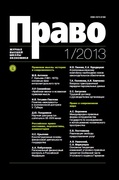Ius Commune Doctrine as a Formal Source of Law in Western Europe in the 12th and 13th Centuries
Abstract
The article features the common law doctrine (ius commune) as a unique phenomenon in the history of the 14-18th century Continental Western Europe. The work studies the prerequisites for its emergence, typical features, reasons to acquire the status of a formal source of law in the High Middle Ages by the doctrine and loosing the status in the Modern Age. The prerequisites for the doctrine was the formation of the legal science as a theoretical discipline in the emerging universities in Northern Italy of the 11-12th centuries, which allowed adjusting the sources of Roman law in a new historical context as well as the demand of the European population for more complicated rules of social regulation having lacked a proper development in common law. Beginning with the 13th century, the most developed regions of Western Europe applied the doctrine which relied on scholastics and suggested common opinion of the most authoritative professors of law (communis opinio). It was being formed as part of studying Roman and canon law at universities. The scientific doctrine was being formed mostly independently from other sources of law such as customs, royal law, urban law and trade law. A formal obligation as a unique feature of the ius commune doctrine became on the one hand the necessity in against the background of political and legal disunity of the medieval Western Europe, the lack of active legislative power and specific features of legal proceedings in the medieval communes. On the other hand, it owes its status to its inner qualities, i.e. universalism, authority and profoundness. As a result in the 14th century, the statutes of many communes codified the right of judges to address experts for the opinion. A strong central power and an active legislative policy of sovereign rulers, the formation of nation states and the disintegration of a single academic environment in Western Europe of the Modern age got the main causes of losing the status of formal source of law by the ius commune doctrine. However, until the first codifications of civil law in the 18th century, general opinion of legum doctors (communis opinio) was crucial for the institution of private law on the European continent.
Copyright (c) 2013 Law Journal of the Higher School of Economics

This work is licensed under a Creative Commons Attribution-ShareAlike 4.0 International License.


















